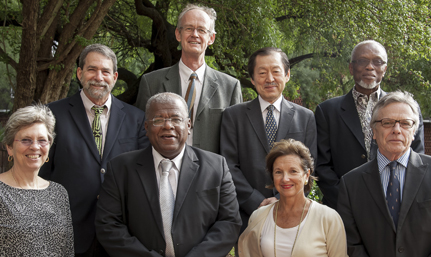Latest News Archive
Please select Category, Year, and then Month to display items
12 October 2020
|
Story Arina Engelbrecht
|
Photo Supplied
 Arina Engelbrecht from Organisational Development and Employee Well-being believes physical activity has a number of benefits for one’s health, including stress relief.
Arina Engelbrecht from Organisational Development and Employee Well-being believes physical activity has a number of benefits for one’s health, including stress relief.
Being physically active plays a big role in preventing the development of mental-health problems and in improving the quality of life of people experiencing mental-health problems.
Treatment for depression
Physical activity can be an alternative treatment for depression. It can be used as a stand-alone treatment or in combination with medication and/or psychological therapy. It promotes all kinds of changes in the brain, including neural growth, reduced inflammation, and new activity patterns are formed that promote feelings of calm and well-being. It releases endorphins – powerful chemicals in the brain that energise your spirit and make you feel good.
Physical activity can be very effective in relieving stress. Research in adults has found that physically active individuals tend to have lower stress levels compared to individuals who are less active. It also leads to improved sleep. When a person sleeps better and feels more rested, overall quality of life improves. They cope better with daily life stressors.
Reduce Alzheimer's risk
Regular physical activity can reduce your risk of developing Alzheimer's disease by up to 50%. It can also slow down further deterioration in those who have already started to develop cognitive problems. It stimulates the brain’s ability to maintain old connections as well as to make new ones.
A study asked people to rate their mood immediately after periods of physical activity (e.g. going for a walk/run, cycling, doing housework) and periods of inactivity (e.g. reading a book or watching television). Researchers found that participants felt more content, more awake, and calmer after being physically active compared to after periods of inactivity.
In conclusion, people who are physically active feel a sense of well-being, feel more energetic throughout the day, sleep better at night, have sharper memories, and feel more relaxed and positive about themselves and their lives.
“Being physically active not only changes your body, it changes your mind,
attitude, and your mood.” – Arina Engelbrecht
Esteemed international Council advises the UFS
2013-03-26
|
 |
|
In front, from the left are: Prof Alice Pell, Vice-Provost for International Relations, Cornell University in the USA; Prof Jonathan Jansen, Vice-Chancellor and Rector of the UFS; Ms Jane Evans, Director of Ntataise Early Child Development Network Support Programme in South Africa; Mr Gert Grobler, Ambassador of South Africa to Madagascar and alumnus of the UFS. At the back, from the left are: Prof Joel Samoff, Professor in African Studies, Stanford University in the USA; Prof Teuns Verschoor, Vice-Rector: Institutional Affairs of the UFS; Prof Masafumi Nagao, Project Professor at the Graduate School for Frontier Sciences, University of Tokyo; and Prof Akilagpa Sawyerr, former Secretary General of the Association of African Universities (AAU), Ghana. Ms Phumzile Mlambo-Ngcuka, former Deputy President of South Africa, was absent when the photo was taken.
Photo: Sonia Small
27 March 2013 |
The International Advisory Council (IAC) of the University of the Free State (UFS) is visiting the Bloemfontein and Qwaqwa Campuses this week as part of its biennial meeting with the university leadership. The Council, consisting of seven leading academics, business leaders and policy makers, are advising the leadership on how well we perform against international benchmarks in research, teaching, service and transformation. The Council also acts as advocates for the university in their own spheres of influence.